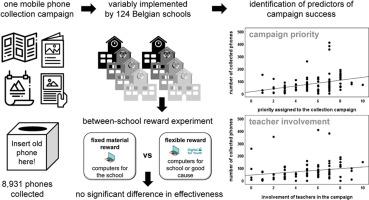如何促进手机回收?比利时学校回收活动评估
IF 3.7
Q2 ENVIRONMENTAL SCIENCES
引用次数: 0
摘要
手机回收对于回收宝贵资源和降低环境健康风险至关重要。回收活动可能有助于回收未使用的手机,但有关此类活动有效性因素的实证证据并不多见。在本研究中,我们评估了在拥有 30,000 多名学生的 N = 124 所比利时学校中如何实施一项相同的收集活动,并将学校之间的实施特点差异与收集的手机数量(共 8,931 部)联系起来。在对收集活动给予更高的优先级(rs = 0.42)和教师参与度更高(rs = 0.36)的学校中,收集到的电话数量更多。所有学校也都收到了有收集条件的奖励,我们还随机为一些学校提供了捐赠奖励的机会,但这一操作并未导致校际间的显著差异。这些结果证明了评估收集活动的有效性,并为今后收集闲置手机的设计提供了参考。本文章由计算机程序翻译,如有差异,请以英文原文为准。

How to promote mobile phone recovery? Evaluation of a collection campaign in Belgian schools
Mobile phone recycling is crucial to recover valuable resources and mitigate environmental health risks. Collection campaigns may help to retrieve unused phones, but empirical evidence on the factors contributing to the effectiveness of such campaigns is rare. In the present study, we assessed how one and the same collection campaign was implemented in N = 124 Belgian schools with over 30,000 students and related between-school variations in implementation characteristics to the number of collected phones (8,931 in total). More phones were collected in schools that assigned a higher priority to the collection campaign (rs = .42) and in schools that reported a higher degree of teacher involvement (rs = .36). All schools also received collection-contingent rewards and we randomly offered some schools the opportunity to donate this reward, but this manipulation did not lead to significant between-school differences. These results support the effectiveness of the evaluated collection campaign and can inform the design of future efforts to collect unused mobile phones.
求助全文
通过发布文献求助,成功后即可免费获取论文全文。
去求助
来源期刊

Cleaner and Responsible Consumption
Social Sciences-Social Sciences (miscellaneous)
CiteScore
4.70
自引率
0.00%
发文量
40
审稿时长
99 days
 求助内容:
求助内容: 应助结果提醒方式:
应助结果提醒方式:


